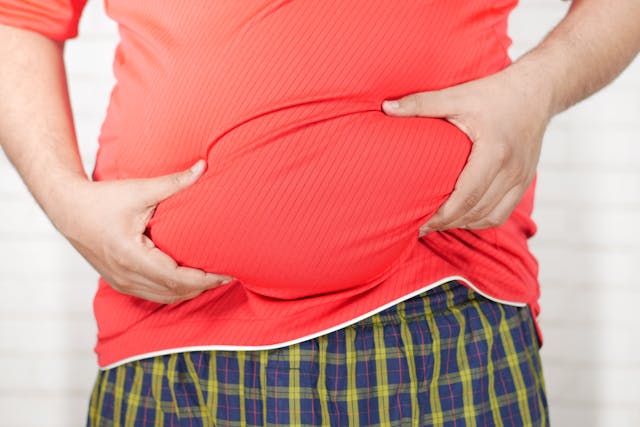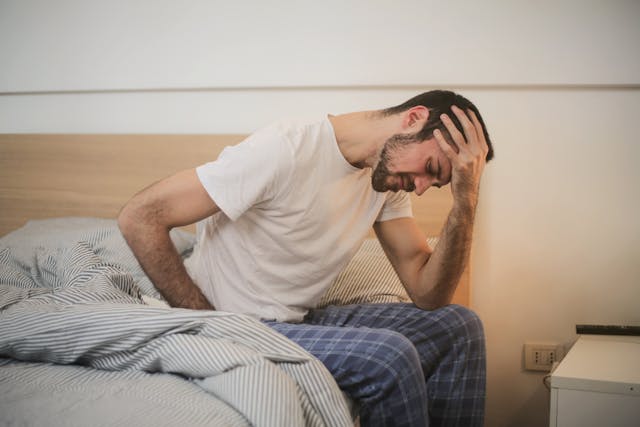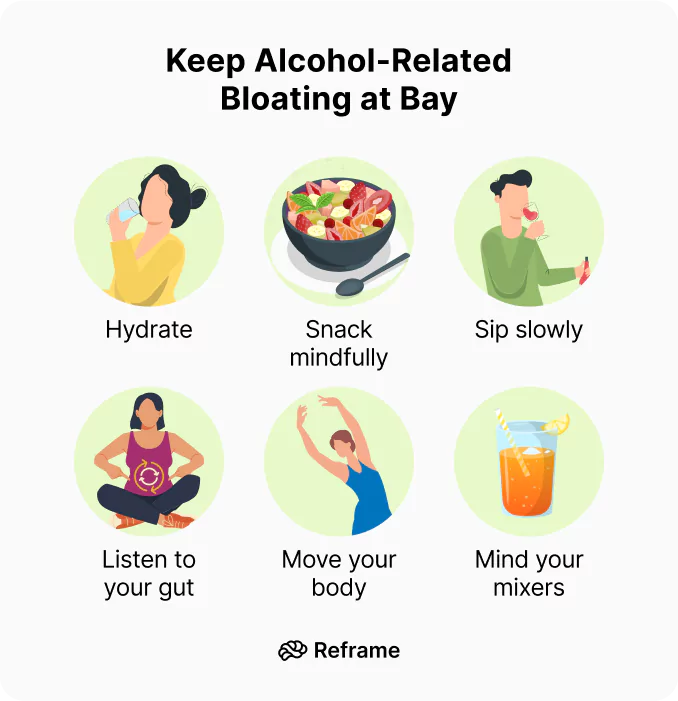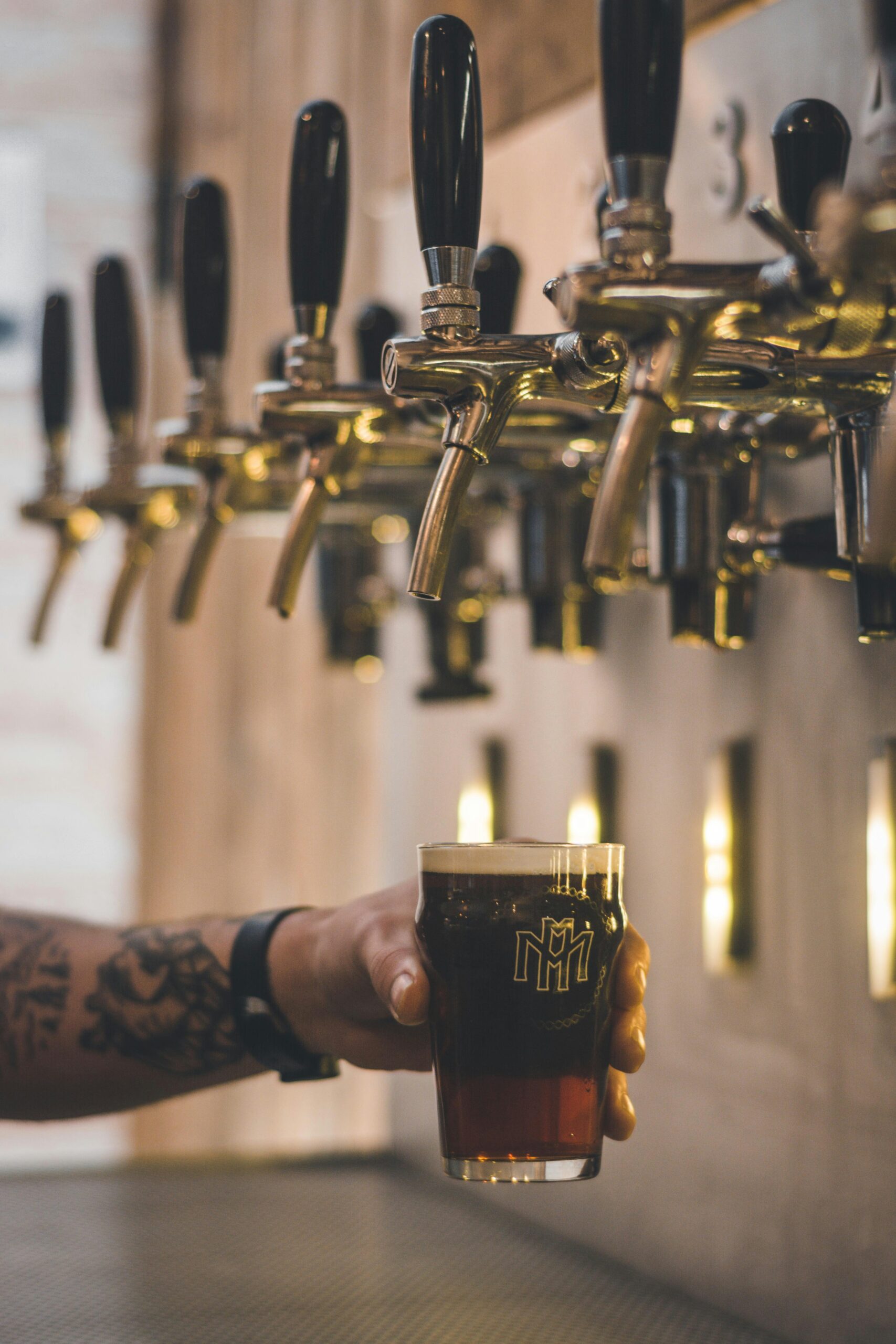
Have you ever pondered why, occasionally, a refreshing pint makes you feel like a balloon about to burst? You’re not by yourself. For many beer aficionados, the phenomena of bloating after drinking beer is not new. But worry not—you can enjoy your brewskis more comfortably if you know the underlying causes. Let’s examine the causes of beer bloating and how to reduce this prevalent, although bothersome, side effect.
Table of Contents
What Beer Doesn’t Bloat You: A Guide to Choosing the Right Brew
Understanding Beer-Related Bloating
Beer-related bloating is a common issue that affects many people who enjoy drinking beer. There are several factors that contribute to bloating, including carbon dioxide, gluten, and stomach issues commonly found in standard beer. In this section, we will explore the causes of beer-related bloating and provide tips on how to reduce its effects.
The Fizzy Factor, or Carbonation
Beer is a fizzy drink that contains carbon dioxide (CO2) that has been dissolved, especially noticeable when enjoying a cold beer. Beer gets its effervescence from the CO2 that is produced when you crack open a cold one. However, what happens if you swallow those bubbles?
Gas Expansion: After consumption, your stomach releases CO2, which may cause bloating and a feeling of fullness. You feel bloated as your stomach grows to make room for the gas.
Burping: Burping can help reduce pressure, but it doesn’t always completely get rid of the bloated feeling.
The Yeasty Beast: Fermentation Byproducts
Beer is made by fermentation, which uses yeast to turn carbohydrates into alcohol and carbon dioxide. This adds to the carbonation process and leaves the brew with yeast and other byproduct traces.
Yeast and Remaining Sugars: These may carry on fermenting in your stomach, resulting in more gas and aggravating bloating.
The Part Alcohol Plays: Alcohol alone has the potential to slow down digestion, which prolongs the time that food and gas remain in your stomach.
The Grain Game: FODMAPs and Gluten
Barley, wheat, and other grains containing gluten and FODMAPs (fermentable oligosaccharides, disaccharides, monosaccharides, and polyols) are frequently used to make standard beer. For certain individuals, these may pose an issue.
Gluten Sensitivity: Beer consumption may cause bloating in people who have celiac disease or gluten intolerance.
FODMAPs: For people who are sensitive to them, these fermentable carbs may produce excessive gas and bloating.
The Supplementary Impact: Consuming Food and Liquor
Beer drinking is frequently paired with food, most commonly salty or fried items that are bloat-inducing in and of themselves.
Salt and Fat: Foods high in fat can slow down digestion and increase water retention, both of which can result in bloating.
Overeating: Eating large meals and drinking beer together can make you feel bloated.

Drinking Habits and Beer Bloating
Drinking habits can play a significant role in beer bloating. The way you drink beer can affect how much carbon dioxide is released in your stomach, leading to discomfort and bloating. Here are some tips to help you enjoy your favorite craft beers without feeling bloated:
Drink slowly and savor: Take your time when drinking beer, and savor the flavor. This can help reduce the amount of carbon dioxide released in your stomach. By drinking slowly, you allow your body to process the carbonation more efficiently, reducing the chances of feeling bloated.
Pour correctly: When pouring beer, try to minimize the amount of foam. Foam can contribute to bloating, so pouring slowly and carefully can help reduce the amount of foam in your glass. A proper pour can make a significant difference in how much gas ends up in your stomach.
Eat before drinking: Having food in your stomach can help slow down the digestion of beer and reduce bloating. Opt for foods that are easy to digest, such as crackers or bread. This can create a buffer in your stomach, making it easier to handle the carbonation and alcohol.
Avoid drinking on an empty stomach: Drinking beer on an empty stomach can lead to faster digestion and increased bloating. Try to eat a meal or snack before drinking beer. This can help your stomach manage the beer more effectively, reducing the likelihood of bloating.
Choose the right beer: Some beers are more likely to cause bloating than others. Beers with high carbonation, such as lagers and pilsners, may be more likely to cause bloating. Opt for beers with lower carbonation, such as ales and stouts. These options can be gentler on your stomach and reduce the chances of feeling bloated.
Consider gluten-free options: If you have gluten intolerance or sensitivity, consider opting for gluten-free beers. Gluten can contribute to bloating and stomach issues in some individuals. Choosing gluten-free options can help you enjoy your drink without the discomfort.
By following these tips, you can enjoy your favorite beers without feeling bloated. Remember to always drink responsibly and in moderation.
Choosing the Right Beer
When it comes to selecting a beer that won’t leave you feeling bloated, there are several factors to consider. Here are some tips to help you choose the right beer:
Opt for low-carb beers: Beers with lower carbohydrate content tend to be easier on the stomach and less likely to cause bloating. These beers often have fewer fermentable sugars, which means less gas production in your stomach.
Consider gluten-free beers: If you have gluten intolerance or sensitivity, choosing a gluten-free beer can help alleviate stomach issues. Gluten can be a significant contributor to bloating for those with sensitivities, so opting for gluten-free options can make a big difference.
Look for beers with lower carbonation: Carbon dioxide can contribute to bloating, so opting for beers with lower carbonation levels may help. Beers with less fizz are less likely to expand in your stomach, reducing the feeling of fullness.
Choose beers with a lighter body: Lighter-bodied beers tend to be easier to digest and less likely to cause bloating. These beers are often less dense and heavy, making them gentler on your stomach.
Avoid beers with high ABV: Beers with higher alcohol content can slow down digestion and contribute to bloating. High ABV beers can be harder for your stomach to process, leading to prolonged digestion and increased bloating.
Some popular beer styles that may be suitable for those who experience bloating include:
Lagers: Lagers tend to be lighter-bodied and lower in carbonation, making them a good option for those who experience bloating. Their crisp and clean profile is often easier on the stomach.
Pilsners: Pilsners are another type of lager that is often light-bodied and easy to digest. They offer a refreshing taste without the heavy feeling.
Session beers: Session beers are designed to be lower in ABV and easier to drink, making them a good option for those who want to enjoy a beer without feeling bloated. These beers are crafted for extended drinking sessions without overwhelming your stomach.
Ultimately, the best beer for you will depend on your individual preferences and needs. Experiment with different styles and brands to find a beer that works for you. By making informed choices, you can enjoy your favorite brews without the discomfort of bloating. Cheers to finding the perfect beer that suits your taste and keeps your stomach happy!

Tips for Drinking Beer Without Bloating
1. Make a wise choice
Low-Carbonation Beers: Choose ales or lagers that have less carbonation compared to standard beer.
Gluten-Free Options: These beers might lessen bloating for people who are sensitive to gluten and provide a favorable alternative to standard beer.
Beers with Lower FODMAPs: Some beers naturally have less FODMAPs, which may be beneficial for people who are sensitive to these substances.
Avoid Mixing with Carbonated Drinks: To minimize gas intake when combining beer with other drinks, use non-carbonated mixers.
Drink Slowly: To reduce the quantity of air consumed, savor your beer rather than downing it quickly.
3. Snack Wise
Select Low-Sodium foods: To avoid water retention, select foods with less salt.
Light Bites: Eat smaller meals or snacks to prevent stuffing your tummy.
4. Stay Hydrated and Modest
Remain Hydrated: Sip water with your beer to help with digestion and lessen bloating.
Moderate Consumption: To avoid severe bloating, keep your beer intake in check.
Common Questions
Q: Compared to other alcoholic beverages, why does standard beer cause more bloating?
A: Compared to other alcoholic beverages like wine or spirits, standard beer has a higher carbonation level and includes fermentable carbs, both of which can cause bloating.
Q: Does drinking lighter beer help with bloating?
A: Although the lower calorie and carb content of light beers may help minimize bloating, high carbonation levels may still exacerbate the condition.
Q: Could beer bloating be an indication of any medical conditions?
A: IBS, gluten intolerance, or sensitivity to FODMAPs are among the illnesses that may be indicated by persistent bloating following beer consumption. It is advisable to see a doctor if symptoms don’t go away.
Final Thoughts
Knowing why beer makes you bloated gives you the power to choose wisely while sipping your favorite brews. Beer bloating can be less bothersome if you choose the correct beer and pay attention to your consumption patterns. Thus, keep these suggestions in mind the next time you go for a pint to enjoy your beverage more comfortably. Cheers to fulfilling beer experiences without bloat!
Dr. Mitchell G. Cohen is a board-certified Internal Medicine specialist with over 34 years of experience in patient-centered healthcare. A graduate of Hahnemann University School of Medicine, Dr. Cohen completed his internship at the University Health Center of Pittsburgh, where he gained invaluable hands-on experience. He is also a certified addiction specialist, holding membership with the American Society of Addiction Medicine (ASAM).
Currently based in Nashua, NH, Dr. Cohen is affiliated with Saint Joseph Hospital, where he provides comprehensive care focusing on both internal medicine and addiction treatment. His expertise includes prevention, diagnosis, and management of adult diseases, as well as specialized care for individuals facing substance use disorders.
Dr. Cohen is committed to fostering open communication, ensuring his patients are fully informed and empowered to make confident decisions about their health and treatment options.

MD Mitchell Grant Cohen
Dr. Mitchell G. Cohen is a board-certified Internal Medicine specialist with over 34 years of experience in patient-centered healthcare. A graduate of Hahnemann University School of Medicine, Dr. Cohen completed his internship at the University Health Center of Pittsburgh, where he gained invaluable hands-on experience. He is also a certified addiction specialist, holding membership with the American Society of Addiction Medicine (ASAM).
Currently based in Nashua, NH, Dr. Cohen is affiliated with Saint Joseph Hospital, where he provides comprehensive care focusing on both internal medicine and addiction treatment. His expertise includes prevention, diagnosis, and management of adult diseases, as well as specialized care for individuals facing substance use disorders.
Dr. Cohen is committed to fostering open communication, ensuring his patients are fully informed and empowered to make confident decisions about their health and treatment options.
- MD Mitchell Grant Cohen
- MD Mitchell Grant Cohen
- MD Mitchell Grant Cohen
- MD Mitchell Grant Cohen
- MD Mitchell Grant Cohen
- MD Mitchell Grant Cohen
- MD Mitchell Grant Cohen
- MD Mitchell Grant Cohen
- MD Mitchell Grant Cohen
- MD Mitchell Grant Cohen
- MD Mitchell Grant Cohen
- MD Mitchell Grant Cohen
- MD Mitchell Grant Cohen
- MD Mitchell Grant Cohen
- MD Mitchell Grant Cohen
- MD Mitchell Grant Cohen
- MD Mitchell Grant Cohen
- MD Mitchell Grant Cohen
- MD Mitchell Grant Cohen
- MD Mitchell Grant Cohen
- MD Mitchell Grant Cohen
- MD Mitchell Grant Cohen
- MD Mitchell Grant Cohen
- MD Mitchell Grant Cohen
- MD Mitchell Grant Cohen
- MD Mitchell Grant Cohen
- MD Mitchell Grant Cohen
- MD Mitchell Grant Cohen
- MD Mitchell Grant Cohen
- MD Mitchell Grant Cohen
- MD Mitchell Grant Cohen
- MD Mitchell Grant Cohen
- MD Mitchell Grant Cohen
- MD Mitchell Grant Cohen
- MD Mitchell Grant Cohen
- MD Mitchell Grant Cohen
- MD Mitchell Grant Cohen
- MD Mitchell Grant Cohen
- MD Mitchell Grant Cohen
- MD Mitchell Grant Cohen
- MD Mitchell Grant Cohen
- MD Mitchell Grant Cohen
- MD Mitchell Grant Cohen
- MD Mitchell Grant Cohen
- MD Mitchell Grant Cohen
- MD Mitchell Grant Cohen
- MD Mitchell Grant Cohen
- MD Mitchell Grant Cohen
- MD Mitchell Grant Cohen
- MD Mitchell Grant Cohen
- MD Mitchell Grant Cohen
- MD Mitchell Grant Cohen
- MD Mitchell Grant Cohen
- MD Mitchell Grant Cohen
- MD Mitchell Grant Cohen
- MD Mitchell Grant Cohen
- MD Mitchell Grant Cohen
- MD Mitchell Grant Cohen
- MD Mitchell Grant Cohen
- MD Mitchell Grant Cohen
- MD Mitchell Grant Cohen
- MD Mitchell Grant Cohen
- MD Mitchell Grant Cohen
- MD Mitchell Grant Cohen
- MD Mitchell Grant Cohen
- MD Mitchell Grant Cohen
- MD Mitchell Grant Cohen
- MD Mitchell Grant Cohen
- MD Mitchell Grant Cohen
- MD Mitchell Grant Cohen
- MD Mitchell Grant Cohen
- MD Mitchell Grant Cohen
- MD Mitchell Grant Cohen
- MD Mitchell Grant Cohen
- MD Mitchell Grant Cohen
- MD Mitchell Grant Cohen
- MD Mitchell Grant Cohen
- MD Mitchell Grant Cohen
- MD Mitchell Grant Cohen







